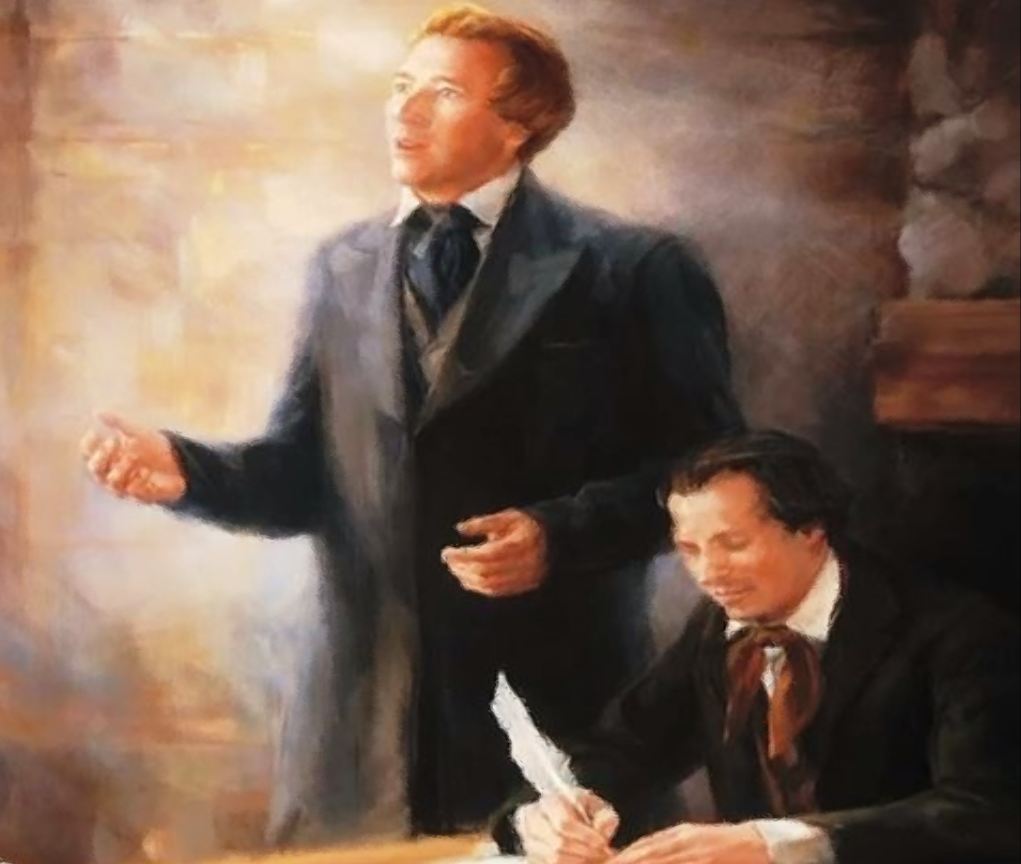 The April 2018 General Conference confirmed a trend that some have noticed in recent years that, as they speak about various policies, practices, and teachings, Church leaders have been using the terms “revelation” and “the will of the Lord” more often than they had in the past century or more. Why might that be? Are instances of powerful revelation occurring more often, or with greater intensity than before–i.e., as some would say, the Lord truly is “hastening His work” and therefore needs to convey things with a greater sense of urgency? Is it simply a trend that has caught on, or merely greater comfort with terms like these that has made Presidents Nelson and Oaks and various apostles use them more often? Are Church leaders expanding their view of what rises to the status of “revelation” versus “inspiration,” or what it means to know “the Lord’s will” versus having the Spirit “confirm” something to them? And so forth?
The April 2018 General Conference confirmed a trend that some have noticed in recent years that, as they speak about various policies, practices, and teachings, Church leaders have been using the terms “revelation” and “the will of the Lord” more often than they had in the past century or more. Why might that be? Are instances of powerful revelation occurring more often, or with greater intensity than before–i.e., as some would say, the Lord truly is “hastening His work” and therefore needs to convey things with a greater sense of urgency? Is it simply a trend that has caught on, or merely greater comfort with terms like these that has made Presidents Nelson and Oaks and various apostles use them more often? Are Church leaders expanding their view of what rises to the status of “revelation” versus “inspiration,” or what it means to know “the Lord’s will” versus having the Spirit “confirm” something to them? And so forth?
It’s an interesting observation, and in this episode, frequent guest Mark Crego shares evidence for this trend and poses questions like this, while Mormon Awakenings podcast host Jack Naneek and Mormon Matters host Dan Wotherspoon ask for clarifications and react to what he offers. If we are seeing a genuine trend emerging, what good benefits can follow from this sort of increased rhetorical punch? What cautions might we want to become alerted to? And in all things, how might we be vigilant in exercising our own rights to personal revelation and our role as church members in offering a check and balance to those who may be taking cues from this increased usage to warn or try to control others in ways that violate the principles of effective spiritual leadership laid out in D&C 121?
Please listen in and then share your ideas on these subjects in the comments section!
______
Links:
Jack Naneek, Mormon Awakenings podcast episodes
“Revelation,” Mormon Matters podcast, Episodes 433–435, 12 December 2017
______
MORMON MATTERS WORKSHOP PRE-REGISTRATION
To Pre-Register for the April 21, 2018 Mormon Matters Workshop, “Mapping the Wilderness: Support and Inspiration for Your Faith Journey” (Co-lead by Dan Wotherspoon and Jana Spangler, with Special Guest Phil McLemore), click below.
Be sure to choose the 1-person or 2-person option, then click the button. You will be able to pay through PayPal or via credit/debit card.
________


Comments 2
Interesting points raised by all on the call. It’s true- the “revelatory” process for administrative tweaks in the church is a type of prayerful inspiration that may be mislabeled as capital “R” revelation. It was certainly worth reflecting on, so thank you for your thoughts. I kept waiting for someone to mention, amidst the hand wringing about a lack of Joseph Smith-style revelations, some sort of acknowledgement of President Eyring’s talk ‘His Spirit Be with You’. He described a vision (I’m going to repeat that- a vision) he received of (brace yourselves) Mary, Angels, and Jesus at the tomb. My ward is bursting with excitement over the changes to VT/HT, the dissolution of HPGs, and President Nelson’s new role, (blah blah blah- administrative stuff), but no one is talking about Eyring’s talk which is the place to appropriately use a capital “R” in Revelation. I am baffled at how we as a people are hyper-fixated on the administrative and are brushing by the ethereal.
Mortimer,
Thank you for that very thoughtful comment.
I do believe that visions are very much part of the Mormon experience. I have experienced some pretty amazing things coming to my mind and heart, either in dreams or in waking “visions” as I might use the term. And President Eyring is reflecting the same kind of vision that Joseph F Smith reflected in our current D&C, with a notable difference: JFS’s vision extended our understanding of the spirit world as his vision laid it out to him.
Such visions give us profound insight, and help us understand the “mysteries of god” (Alma 12:9-11). For President Eyring, his vision is a tangible *witness* as part of his deep testimony — and such witness-styled testimony ought to be what we all embrace, rather than rote, repeated truth claims.
There is a difference, however, in any concept we might call “the Will of the Lord” — and this is my point of departure here. Listening to President Eyring’s testimony, I am motivated not to action, but rather to devotion — to seek such a witness of my own and to develop or enhance the relationship I have with god. In contrast, when a leader proclaims that a policy is the “Will of the Lord”, there is a call to action, and there is no part of this that is my “witness”. That’s the difference.
When we consider what Alma charged us to do at the Waters of Mormon (Mosiah 18), we find four actions we are to do as Member:
1. Lift each other’s burdens that they may be light,
2. Mourn with those who mourn,
3. Comfort all those who stand in need of comfort, and
4. Stand as witnesses of God at all times and in all places we may be.
When we consider what Jesus stated as his first commandment, second commandment, greatest commandment, new commandment, and his last commandment in the flesh, he stated one thing: To love God and each other, in exactly the same way that Jesus loves us — unconditionally.
Yet in our church, we here the non-scriptural, non-revealed doctrine: “Obedience is the first law of heaven.” If we follow former President Uchtdorf’s counsel in his talk about the lost sheep, obedience is the consequence of our receiving god’s unconditional love, it is not the criteria for god to love us.
So when I hear our prophets seers and revelators proclaim that the Policy of Exclusion, the legal brief known as “The Family; A Proclamation”, or some policy and organizational restructuring announcements are “the Will of the Lord”, I look at them and try to make sense of them. And you know? It’s very tough.
I would absolutely proclaim with you that President Eyring’s witness of his vision is Revelation. As for the rest? not so sure.